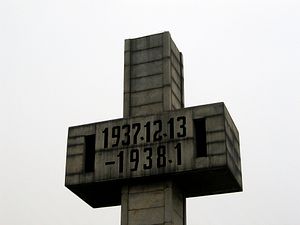Back in February, China’s National People’s Congress approved the creation of two new national days remembering the events of World War II – and striking at what China sees as historical revisionism by modern-day Japan. Victory Day, marking Japan’s surrender in what China calls the “War of Resistance Against Japanese Aggression,” was celebrated on September 3 with a commemorative ceremony attended by China’s top leaders. Saturday, Chinese leaders gathered again for the first-ever National Memorial Day for Nanjing Massacre Victims.
In the lead-up to December 13, Chinese media carried a slew of reports on the atrocities that followed the fall of Nanjing to Japanese forces in 1937. The Chinese Communist Party released archived historical records pertaining to the massacre, from contemporary journalistic accounts to eyewitness testimonies. Xinhua also published its own detailed commentary called “Memories of blood and terror – Revisiting Nanjing,” which included interviews from eyewitnesses. One man, Chang Zhiqiang, recounted the gruesome story of his mother and infant brother being bayoneted by a Japanese soldier (repeatedly referred to as a “devil” in Chang’s account). Another survivor, Wu Zhengxi, told Xinhua that his only wish is “to live to hear the Japanese sincerely apologize.”
The publicity push, particularly the wealth of English-language pieces, underlines China’s efforts to expand remembrances of the Nanjing Massacre from a Chinese tradition to a global one. “The massacre in Nanjing 77 years ago should not only be remembered as crimes against the Chinese, but atrocities against all that is human,” one commentary in Xinhua argued. The same piece lamented the fact that Japanese war crimes committed against China have received relatively little international attention, and blamed this on “the Cold War power game” that saw the U.S. allied with Japan against China and the USSR.
On the Memorial Day itself, Xi Jinping and other Chinese leaders attended a high-profile ceremony in Nanjing. The ceremony was live broadcast by CCTV, Chinese radio, and the websites of Xinhua and People’s Daily, another push in China’s publicity campaign. In remarks given during the ceremony, Xi warned that denials of the Nanjing Massacre “will not be allowed by history, the souls of the 300,000 deceased victims, the 1.3 billion Chinese people, and all people who love peace and justice in the world.” However, he also made clear that historical issues should not lead to enmity. “We should not bear hatred against an entire nation just because a small minority of militarists launched aggressive wars,” Xi said.
Likewise, state media were adamant that the Memorial Day was not aimed at stirring up resentment against Japan. China Daily ran an article titled “Nanjing homage day not to plant hatred,” which concluded that “China has no intention of spawning hatred against Japan by reminding its people of the bloody past.” Yet tellingly, the piece focused almost entirely on the political history of the “whitewashing of [Japan’s] militarist past.” China’s high-profile remembrance of the Nanjing Massacre is not meant to foster “hatred” between China and Japan, but it is a clear attempt to counter denials of the massacre (and, by extension, other wartime atrocities) by certain segments of Japanese society. One piece in Xinhua expressed hope that the Memorial Day could “perhaps jolt Japan out of its state of historical amnesia.”
Even as China recognizes the importance of repairing ties with Japan, the gap in historical interpretations remains a daunting obstacle in bilateral relations. As I noted back in November, the “four point consensus” that will allow China and Japan to resume a somewhat normal relationship merely papered over many of the crucial issues, including historical questions. The two sides reached “some agreement” on the importance of “facing history squarely and looking forward to the future” – language that doesn’t meet China’s demand for Japan to adopt a “proper attitude” toward history.
The Nanjing Massacre is an especially sensitive issue in China-Japan relations. China claims some 300,000 were killed in the six weeks after December 13, 1937, when the city fell to Japanese forces. That number has been hotly disputed in Japan, with some Japanese officials denying that the massacre even took place. As a result, in China the Nanjing Massacre has become a poignant symbol both for the brutality of the war and for Japanese “whitewashing” of its past.

































